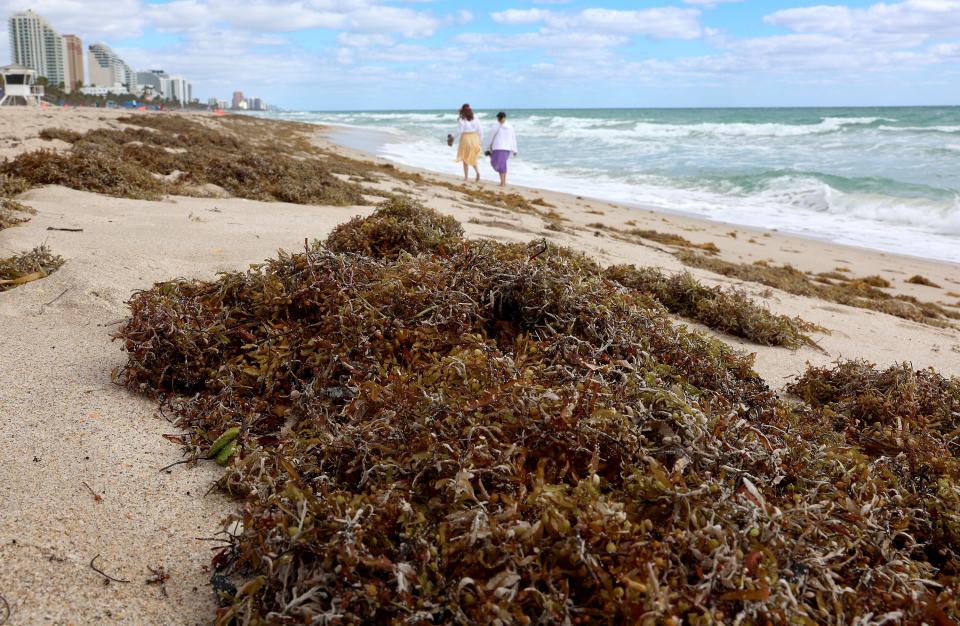Your Memorial Day beach plans may be less than fin-tastic: Watch for sharks, rip currents
As usual, the beach will be a prime destination for folks this Memorial Day weekend, and with the fun and sun comes a few hazards, from stinky seaweed and hungry sharks to dangerous rip currents and bone-chillingly cold water. Here's what to be aware of as you head to the beach this weekend.
Your seaweed forecast
Seaweed should have "minimal impact" at Florida beaches this holiday weekend, according to University of South Florida oceanography professor Chuanmin Hu. "I wouldn't be too worried about it," he told USA TODAY, while admitting that seaweed levels won't be at zero, and that people will still see it at some beaches, including in the Florida Keys.
Hu added that seaweed, aka sargassum, has been seen offshore of beaches in the Gulf of Mexico in Texas and at the Mississippi Delta. Overall, it's "still far away from the beaches there," he said.
Another sargassum expert, Christine J. Mariani of Sargassum Monitoring, told USA TODAY that "we estimate that this weekend the beaches of Florida will be free of sargassum." However, if weather conditions continue as forecast, a "large mass of sargassum is likely to impact Florida, the Bahamas and the Keys within the next 10 to 15 days."
Blob spotted: Sargassum, seaweed that sometimes resembles a big brown blob, seen in Fort Pierce, Florida
Sargassum is a lifeline for fish nurseries, hungry migratory birds and sea turtle hatchlings seeking shelter in its buoyant saltwater blooms. But in mass quantities, it chokes life from canals, clogs boat propellers and is a killjoy at the beach, piling up several feet deep like a rotting bog emitting hydrogen sulfide – which smells like rotten eggs – as it decomposes. It can irritate the eyes, nose and throat.
"Over the past several years, South Florida and the Caribbean have experienced high levels of sargassum in coastal waters and on local beaches," according to the Miami-Dade County government. "Excessive amounts of sargassum in populated areas are causing concern worldwide."

Sharks in Massachusetts
Meanwhile, folks at beaches in Massachusetts should be extra cautious this weekend after multiple marine mammals were found with white shark bites recently.
“Although we haven’t seen a white shark just yet this season, we know they’re here. With beach weather in the forecast and Memorial Day weekend approaching, this is a good reminder for people to review shark safety guidelines and be shark smart,” John Chisholm, a scientist at the New England Aquarium, said in a statement.
Chisholm emphasized the importance of being aware of sharks’ presence in shallow waters, avoiding areas where seals are present or schools of fish are visible, and staying close to shore where emergency responders can reach you if needed.
Danger in the water: Fatal attacks, bites from sharks rose in 2023. Surfers bitten the most.
Nationally, according to TrackingSharks.com, there has only been one reported shark bite in the U.S. so far in 2024. It was in South Carolina earlier in May and was not fatal. Last year, there were 36 reported shark bites in the U.S., and two fatalities, according to the International Shark Attack File.
Frigid water can be dangerous
To the north in Maine, the threat to beachgoers is the temperature of the water, the weather service said. "The warm air temperatures in the low 70s to upper 60s may cause people to underestimate the dangers of the cold water temperatures, which are currently only in the mid 40s," the weather service in Caribou, Maine, warned on Friday.
"The cold temperatures can quickly cause hypothermia to anyone immersed in the water," the weather service said. "Anyone on boats or paddle craft should use extreme caution to avoid this threat."
Rip currents are a deadly beach hazard
As of Friday afternoon, a rip current warning was in effect for beaches near Brownsville, Texas, according to the National Weather Service. Rip currents remain a deadly beach hazard, as they cause about 100 drowning deaths each year in the U.S., according to the weather service.
A rip current is a narrow, strong current that flows quickly away from the shore. The currents often flow perpendicular to the shoreline, moving water away from the surf and into the ocean. "Rip currents can sweep even the best swimmers away from shore into deeper water," the weather service warned.
Beach danger: Graphics show how rip currents endanger swimmers
Over 10 days last summer, rip currents were blamed for seven deaths in Panama City Beach, Florida – the highest number of beach fatalities for any single location in 2023.
Here's what to do if you're caught in rip current.
Contributing: Jennifer Sangalang and Eric Hasert, Treasure Coast Newspapers; Kimberly Miller, Palm Beach Post
This article originally appeared on USA TODAY: Memorial Day weekend beach vibes will be ...dangerous? Our forecast

